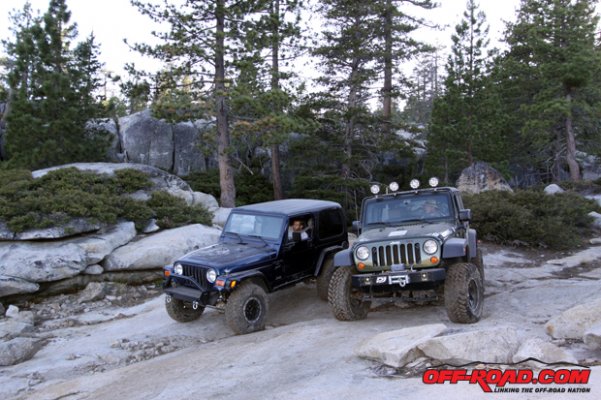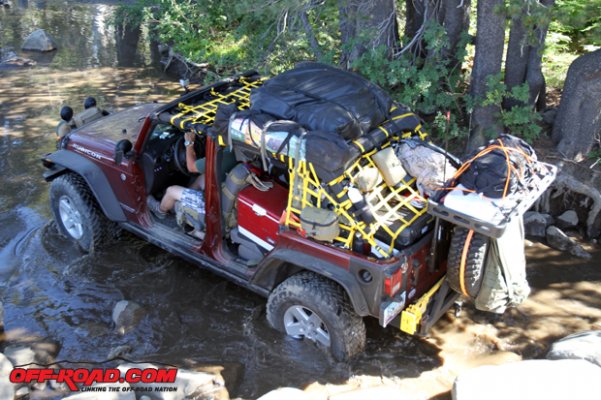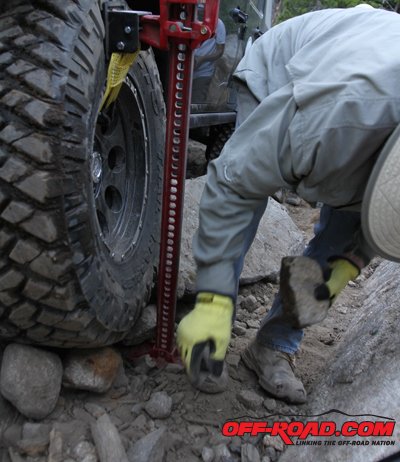KaiserM715
Kaiser Söze
Trail Tips 10 Safety Rules for Off-Road Driving: Off-Road.com
Four-wheeling is one of the more exciting hobbies one can experience. Going off road provides a unique perspective and offers the opportunity to see places you would not otherwise see. It also provides a great challenge, as the terrain is far different from standard roads and freeways on which we are all so accustomed to driving. It’s easy to find yourself in a remote and very hostile environment in just a few hours. Follow these very important rules for a safer and more enjoyable ride.
1. Let Someone Know
Let someone know where you will be and when you expect to return. This applies to all trips, not just those in challenging areas. People have gotten stuck or lost in relatively easy terrain. Should something happen and you’re unable to leave the area or call for help, your friends or family will know to contact authorities.
2. The Buddy System
Always have at least one other vehicle along. This ensures that you will have transportation out in the event your vehicle becomes stuck or damaged and can’t be fixed there. Plus, the extra vehicle means additional manpower to help with problems.
 Always travel with a buddy. They can help get you out of binds and vice versa.
Always travel with a buddy. They can help get you out of binds and vice versa.
Other Trail Tip Stories on Off-Road.com:
http://www.off-road.com/trails-events/trail-tips-10-axioms-of-4-wheeling-53515.html
3. Pack Extra
Pack survival gear. Even a Sunday drive on the beach can turn sour. Pack the proper gear to get you through the night and to handle medical emergencies that may occur. Extra water is near the top of the list, too.
4. Strap it Down
Tie everything down inside the vehicle. Your gear will go flying around if you roll over or lay the vehicle on its side. Loose items become missiles that can injure and kill anyone inside.
 Make sure everything in and out of your vehicle is properly strapped down before you hit the trail.
Make sure everything in and out of your vehicle is properly strapped down before you hit the trail.
5. Buckle Up
Everyone needs to wear a seatbelt just like when you drive on paved roads. You and your passengers will get jostled around quite a bit on many of the trails. Plus, the possibility for a rollover or crash exists at any time. The big rock you suddenly hit could cause you or your passengers to go flying out a window. Make sure everyone is belted in.
6. Stay Inside – All of You
Arms and legs must remain inside the vehicle. Many trails run through narrow passageways. Any arms or legs hanging outside can get injured of caught on trees, cliff walls or rocks just outside your vehicle. If the vehicle begins to tip your instinct is to put your hand out. There is no way you will be able to stop a vehicle this way. Roll your windows up if you can’t control the urge.
Also, make sure no one holds onto the roll bar. Their fingers will get smashed in the event of a roll over. Hands can also be injured if you drive under low-hanging branches.
7. Take a Break
Quit if you become tired. Four-wheeling requires the utmost concentration. Any letdown can lead to an accident and perhaps worse. If you feel fatigued at all, pull over and rest or let someone else drive. Do not force it.
8. E-Brake On When Stopped
Lock it down. When driving off-road, you are seldom on level ground. Make sure your vehicle will not roll away from you. When you stop, apply the emergency brake, put the vehicle in park, and turn off the engine.

9. No Hanging
Do not hang on a vehicle. If the vehicle gets stuck in a precarious position, do not try to pull it down or otherwise tip it by hand, and absolutely do not climb on the vehicle. Use the proper tools and techniques and always be a safe distance away. A vehicle can and will crush you if given the chance.
10. Show Respect – To the Tools
Treat winches and Hi-Lift straps with respect. The straps, clevises, and other pieces are under extreme tension when in use. Inspect all parts before using, and stand clear while you are trying to recover a vehicle. A failure in gear or rigging can be lethal to you and by standers.
Four-wheeling is one of the more exciting hobbies one can experience. Going off road provides a unique perspective and offers the opportunity to see places you would not otherwise see. It also provides a great challenge, as the terrain is far different from standard roads and freeways on which we are all so accustomed to driving. It’s easy to find yourself in a remote and very hostile environment in just a few hours. Follow these very important rules for a safer and more enjoyable ride.
1. Let Someone Know
Let someone know where you will be and when you expect to return. This applies to all trips, not just those in challenging areas. People have gotten stuck or lost in relatively easy terrain. Should something happen and you’re unable to leave the area or call for help, your friends or family will know to contact authorities.
2. The Buddy System
Always have at least one other vehicle along. This ensures that you will have transportation out in the event your vehicle becomes stuck or damaged and can’t be fixed there. Plus, the extra vehicle means additional manpower to help with problems.
 Always travel with a buddy. They can help get you out of binds and vice versa.
Always travel with a buddy. They can help get you out of binds and vice versa. Other Trail Tip Stories on Off-Road.com:
http://www.off-road.com/trails-events/trail-tips-10-axioms-of-4-wheeling-53515.html
3. Pack Extra
Pack survival gear. Even a Sunday drive on the beach can turn sour. Pack the proper gear to get you through the night and to handle medical emergencies that may occur. Extra water is near the top of the list, too.
4. Strap it Down
Tie everything down inside the vehicle. Your gear will go flying around if you roll over or lay the vehicle on its side. Loose items become missiles that can injure and kill anyone inside.
 Make sure everything in and out of your vehicle is properly strapped down before you hit the trail.
Make sure everything in and out of your vehicle is properly strapped down before you hit the trail. 5. Buckle Up
Everyone needs to wear a seatbelt just like when you drive on paved roads. You and your passengers will get jostled around quite a bit on many of the trails. Plus, the possibility for a rollover or crash exists at any time. The big rock you suddenly hit could cause you or your passengers to go flying out a window. Make sure everyone is belted in.
6. Stay Inside – All of You
Arms and legs must remain inside the vehicle. Many trails run through narrow passageways. Any arms or legs hanging outside can get injured of caught on trees, cliff walls or rocks just outside your vehicle. If the vehicle begins to tip your instinct is to put your hand out. There is no way you will be able to stop a vehicle this way. Roll your windows up if you can’t control the urge.
Also, make sure no one holds onto the roll bar. Their fingers will get smashed in the event of a roll over. Hands can also be injured if you drive under low-hanging branches.
7. Take a Break
Quit if you become tired. Four-wheeling requires the utmost concentration. Any letdown can lead to an accident and perhaps worse. If you feel fatigued at all, pull over and rest or let someone else drive. Do not force it.
8. E-Brake On When Stopped
Lock it down. When driving off-road, you are seldom on level ground. Make sure your vehicle will not roll away from you. When you stop, apply the emergency brake, put the vehicle in park, and turn off the engine.

9. No Hanging
Do not hang on a vehicle. If the vehicle gets stuck in a precarious position, do not try to pull it down or otherwise tip it by hand, and absolutely do not climb on the vehicle. Use the proper tools and techniques and always be a safe distance away. A vehicle can and will crush you if given the chance.
10. Show Respect – To the Tools
Treat winches and Hi-Lift straps with respect. The straps, clevises, and other pieces are under extreme tension when in use. Inspect all parts before using, and stand clear while you are trying to recover a vehicle. A failure in gear or rigging can be lethal to you and by standers.

